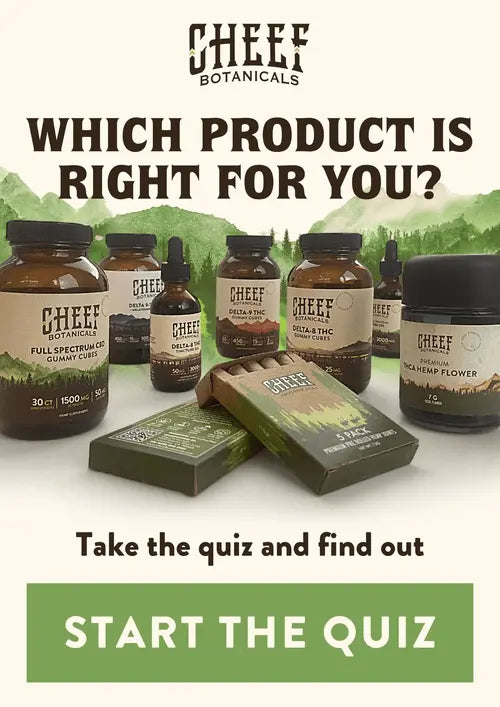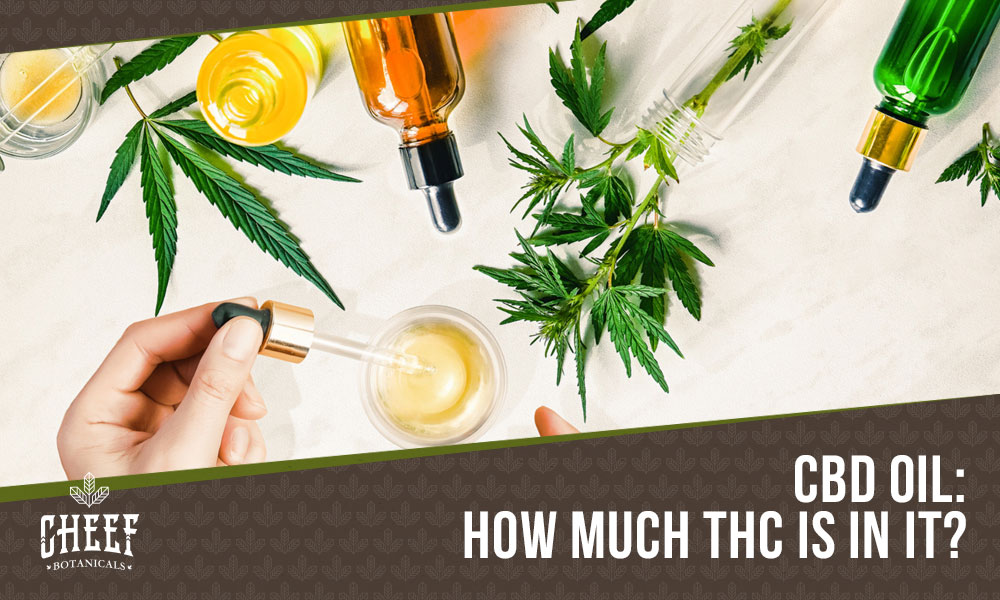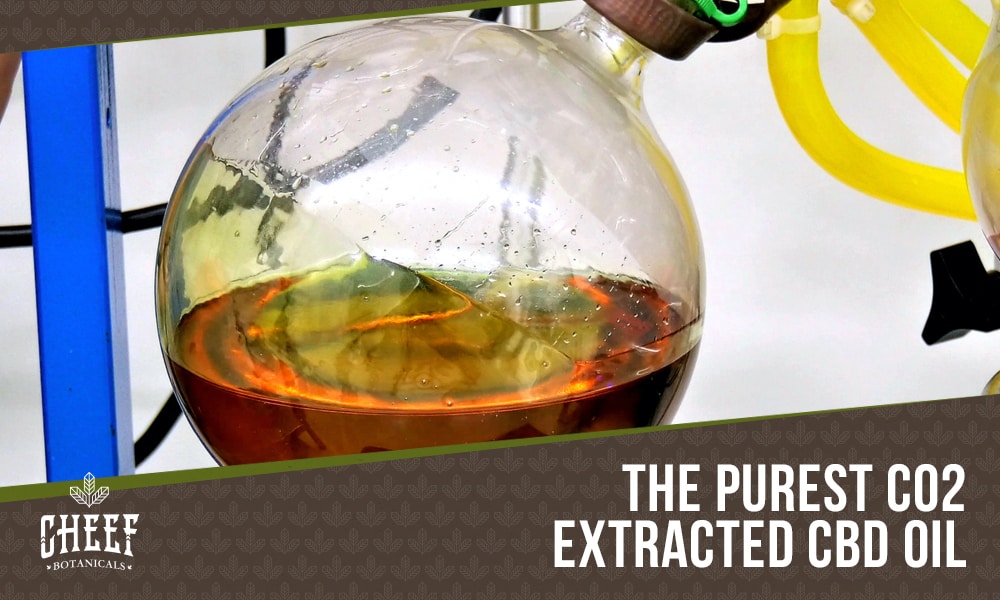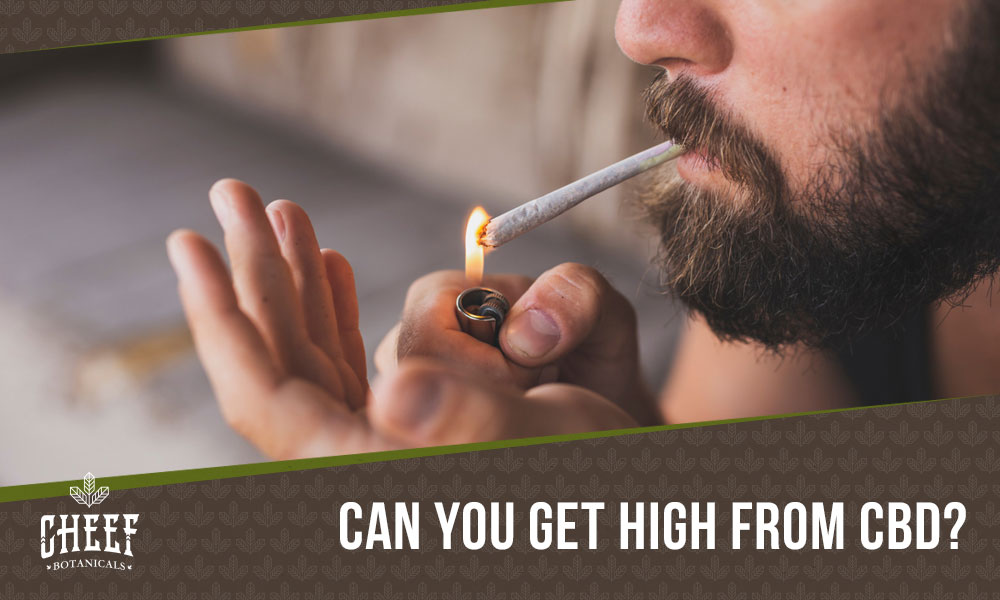How Much THC Is in CBD Oil? How To Identify CBD & THC Ratios
When people talk about cannabidiol, more commonly known as CBD, they often use terms like "full spectrum," "broad spectrum," or "isolate." These words describe whether the CBD product contains any tetrahydrocannabinol (THC) in it. You may be wondering how much THC is in CBD oil, and why it's involved at all?
Many find that the biggest appeal of CBD is that there are no intoxicating effects that come with its soothing and relaxing benefits. Although, some people find it surprising that there are full spectrum CBD products that include THC but, they will not get you "high." So why do industry-leading companies like Cheef Botanicals use tetrahydrocannabinol in some of our formulas?
This guide will explain full spectrum, broad spectrum, and isolate products, as well as how much THC is in each type of CBD oil. With these cannabidiol facts, you will know exactly what you're buying!
What is CBD Oil?
CBD oil, also referred to as tinctures, is one of the most widely available and often used CBD products on the market. It is a liquid that can be mixed with food or drink, dropped on or underneath the tongue, and rubbed onto the skin. CBD oil contains several components that will further illustrate where THC fits into the mix.
THC and CBD are both cannabinoids, which are compounds derived from the cannabis plant. Many people hear cannabis and immediately think of marijuana, but they are not synonymous terms. It is crucial that we make their differences clear before discussing the relationship between CBD and THC.
The Cannabis genus of plants includes both the marijuana and hemp strains. Both plants have THC and CBD, but marijuana has much more tetrahydrocannabinol cannabinoids (more than 0.3% THC) than hemp, which is richer in CBD (0.3% THC or less). The medical and recreational marijuana industries both benefit from the rich THC content of marijuana plants, but the CBD industry turns to hemp for its high CBD levels.
CBD can be derived from hemp using several methods, but some of these involve questionable solvents such as butane or isopropyl. Cheef Botanicals instead opts for the cleanest extraction method, which is an ultra-clean procedure that uses natural CO2. CO2 extraction yields clean, hemp-derived CBD that doesn't contain trace amounts of harmful solvents.
RELATED: Co2 Extracted Oil: The Cleanest CBD Oil Available
We then add a carrier oil to minimize skin irritation and maximize absorption rates, and the final product is top-tier CBD oil. As we mentioned at the top of this article, CBD products can be either full spectrum, broad spectrum, or isolate formulations. Full spectrum products contain a small amount of THC (0.3% or less). Broad spectrum and isolate products contain no THC at all.

What's in Hemp?
If some cannabidiol formulations have THC and others don't, but neither leaves you feeling intoxicated, groggy, or "high," then what's the difference between these two different types of CBD products? Well, it's all about the entourage effect. Before we can explain the entourage effect, we should look at some of the other compounds extracted from the hemp plant.
Hemp contains high levels of CBD and low amounts of THC. Both compounds are examples of cannabinoids. A cannabinoid refers to a compound that is derived from the cannabis plant, and there are over 100 cannabinoids that we know of. These compounds each come with their own effects and benefits.
Terpenes and flavonoids are also extracted from hemp. Terpenes affect the plant's flavor and smell, while flavonoids influence its color. These terpenes and flavonoids can be repurposed and used in CBD products, which adds to the flavor and overall benefits of the product.
RELATED: CBD and Terpenes
When all of the compounds naturally found in cannabis are ingested together, their synergy boosts the CBD product's overall effectiveness. This synergy is what we call the entourage effect, and it is strongest when CBD and THC work together. However, the entourage effect is still present without high amounts of tetrahydrocannabinol.
Full spectrum products contain just enough THC to induce the full force of the entourage effect without exceeding the legal limit (0.3%). Meanwhile, broad spectrum products are THC-free but they contain all the other elements in the plant. Consequently, broad spectrum products offer a "partial entourage effect."
Isolate formulations are made of pure CBD (+99.9%) which means they contain no other cannabinoids, terpenes, or flavinoids. Isolate products do not initiate the entourage effect but they do provide the pure benefits of CBD. Broad spectrum and isolate products are a great alternative for those who wish to avoid THC.
How Much THC is in Hemp?
The two different forms of cannabis are marijuana and hemp. The THC content in marijuana is high, but hemp has only a small amount of it. In federally approved, American-grown hemp, there should be a maximum of 0.3% THC present.
You may find yourself wondering whether a CBD product actually contains legal amounts of THC, or if they're just claiming it does. After all, how would we really know what's in the product until we take it? Well, the answer lies in certificates of analysis, or COAs.
Like with anything we purchase, many fans of CBD want to feel content that what they're buying is safe. That's why we at Cheef Botanicals send all of our CBD products to a third-party lab for testing. Allowing an unbiased, separate company to test our CBD oil ensures that the label accurately describes what the product contains.
If the product passes the test and only contains legal amounts of CBD and THC, the third-party lab verifies this on the certificate of analysis. You should not purchase CBD oil and other cannabidiol items from a manufacturer that does not provide a certificate of analysis for their product. It also should not be difficult to obtain a COA from a reputable business, as they should be readily available for anyone to view.
What is THC?
You may be reading all of this information about THC content and want an explanation as to just what exactly tetrahydrocannabinol even is. This is one of the most common questions we get and a completely understandable one. This cannabinoid can serve a variety of purposes, and it plays an important role in the entourage effect.
THC is found in the resin that is secreted by glands of the hemp plant. It is intoxicating when taken in large doses, which is why full spectrum CBD products only contain 0.3% THC or less. Legal US hemp must be grown under strict federal regulations. Ensuring that your CBD products come from American crops and have COAs are the best ways to be confident that the product is legal and its label is accurate.
If you are in a situation where you have to take a drug test, be aware that THC is the cannabinoid that these tests are looking for. There should not be enough THC in CBD oil derived from hemp to trigger a positive test, but some medical marijuana products might have more significant tetrahydrocannabinol content. If you live in a state that allows medical marijuana to be sure to pay attention to the amount of THC listed on the label. If you are concerned about a false positive drug test, consider broad spectrum or isolate options.
Effects of THC
There are both positive and negative effects of THC. This all depends on the amount you take, your body's reaction to the cannabinoid, and the quality of the ingredients. When THC is taken in trace amounts (0.3% or less) and combined with CBD it promotes calming and tranquil feelings. It does so by boosting the functionality of our endocannabinoid system (ECS).
Our ECS regulates functions in our body such as digestion, mood, sleep, and skin health. The system supports the balance, or homeostasis, of our internal ecosystem.
RELATED: The Endocannabinoid System & CBD
When THC is taken in small amounts and combined with CBD, effects can include:
- reduced skin irritation
- decreased nervousness
- mood enhancement
- discomfort relief
- appetite boost
Though it was illegal in years past, THC is now being studied for its potential medical uses. When more than 0.3% of THC is taken, it may induce intoxicating effects. These effects are what draws some to THC, but they are not for everyone. Some of the adverse effects of THC may be:
- impaired memory
- impaired body movement
- altered sense of time
- mood swings
- difficulty with critical thinking
In higher doses, effects can include:
- hallucinations
- delusions
- psychosis
How Much THC is in CBD Oil?
The tetrahydrocannabinol content in CBD products must be low enough to preserve the positive effects, but not high enough to induce any negative effects. That is why, when it comes to full spectrum products, there is 0.3% or less THC in CBD oil. This level is the "sweet spot," so to speak, and it results in the best possible cannabidiol experience.
Broad spectrum CBD oil offers the same great CBD without any THC. Even though the entourage effect is not as strong in these products, it is still at work. Isolate CBD oil formulations only contain CBD. Both Broad and Isolate formulations are exceptional options for those who are concerned about drug tests.

Final Thoughts - How Much THC is in CBD Oil?
CBD oil is a versatile and convenient method of cannabidiol consumption for many people. Be on the lookout for American-grown hemp, COAs, and levels of 0.3% THC or less when shopping. Follow this guide and buy from reputable manufacturers for a CBD experience that is legal, safe, and most importantly, enjoyable.
If you have any questions about tincture, edibles, vape cartridges, or any CBD-related topic, Cheef Botanicals has got you covered. We have great customer support and we've got all your CBD needs covered. Whether you decide to take CBD with THC or not, that's completely up to you!



 CBD Gummies - Top Seller
CBD Gummies - Top Seller
 CBD + THC Gummy - Excellent Choice
CBD + THC Gummy - Excellent Choice
 CBD Hemp Flower - Highly Rated
CBD Hemp Flower - Highly Rated
 Full Spectrum CBD Oil - Good Value
Full Spectrum CBD Oil - Good Value



Leave a comment
This site is protected by hCaptcha and the hCaptcha Privacy Policy and Terms of Service apply.